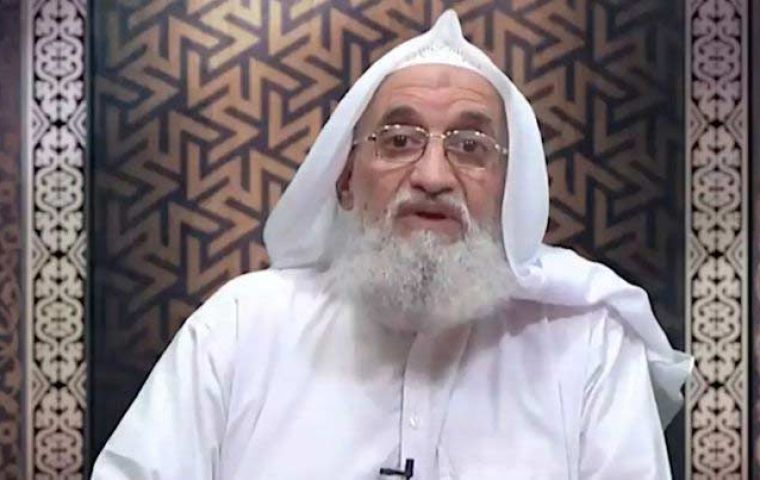MercoPress. South Atlantic News Agency
US drone strike kills Osama bin Laden's successor as Al-Qaeda chief
 At any rate, evidence suggests Al-Qaeda will survive al-Zawahri's death, just as it did bin Laden's
At any rate, evidence suggests Al-Qaeda will survive al-Zawahri's death, just as it did bin Laden's An Al-Qaeda leader who was believed to have been involved in the so-called 9/11 attacks has been killed in a drone attack by US forces. Upon announcing the outcome of the mission, President Joseph Biden said about Ayman al-Zawahiri, that “this terrorist leader is no more.”
The alleged terrorist chief was targeted in Kabul where he was hiding out with his family. Biden approved the operation last week and it was carried out Sunday. The strike was reportedly carried out by the CIA, according to US media citing unnamed sources.
Al-Zawahiri was said to have been closed to Osama bin Laden, who was gunned down in Pakistan on May 2, 2011, in an operation carried out by US Navy SEALs.
The operation against Al-Zawahiri has been hailed as a significant counterterrorism win for the Biden administration just 11 months after American troops left the country after a two-decade war.
Biden praised the US intelligence community for “their extraordinary persistence and skill.”
Al-Zawahiri was a pivotal figure in Al-Qaeda's history, first as bin Laden’s second-in-command since 1998 and then as his successor.
Al-Qaeda was reportedly trying to reconstitute in Afghanistan, where it faced limited threats from the now-ruling Taliban and new attacks against the US are on the radar. Hence the threat Sunday's mission sought to prevent. Al-Zawahiri had reportedly continued to “provide strategic direction,” since the United States remained al-Qaeda's “primary enemy.”
On July 1, Biden had been briefed about the operation. He gave his nod Thursday. Al-Zawahiri was standing on the balcony of his hideout when two Hellfire missiles were launched from an unmanned drone, killing him. No one else was believed to have been killed in the operation.
“We make it clear again tonight: That no matter how long it takes, no matter where you hide, if you are a threat to our people, the United States will find you and take you out,” Biden insisted.
Zawahiri, on the FBI’s Most Wanted Terrorist list, had a $25 million bounty on his head for any information that could be used to kill or capture him.
There had been rumors of al-Zawahiri’s death on and off for several years. But a video surfaced in April of the al-Qaeda leader praising an Indian Muslim woman who had defied a ban on wearing a hijab.
Afghanistan’s Taliban government “strongly“ condemned the operation claiming it was in ”clear violation of international principles and the Doha Agreement,” the 2020 US pact with the Taliban that led to the withdrawal of American forces.
Ayman al-Zawahri was an Egyptian-born jihadist who became al-Qaida's top leader in 2011 after his predecessor, Osama bin Laden, was killed by a US operation. Al-Zawahri also struggled to shake rumors that he was a prison informer while detained in Egypt.
With the collapse of the Islamic State group's caliphate in 2019, the return to power in Afghanistan of Al-Qaedaally the Taliban, and the persistence of Al-Qaeda affiliates especially in Africa, the group resurfaced as a strong threat.
Killing or capturing top terrorist leaders force succession struggles that disrupt group cohesion and can expose security vulnerabilities. Unlike the Islamic State, which has clear leadership succession practices that it has showcased four times since the 2006 death of its founder Abu Musab al-Zarqawi, al-Qaida's are less clear. Al-Zawahiri's successor will only be the movement's third leader since forming in 1988.
The top contender is former Egyptian colonel Saif al-Adel, who belonged to Al-Qaida's ally, the Egyptian Islamic Jihad. He is linked to the 1998 bombings of US embassies in Tanzania and Kenya that launched Al-Qaeda as a global jihadist threat. His reputation as an explosives expert and military strategist has won him strong standing within the Al-Qaeda movement.
At any rate, evidence suggests Al-Qaeda will survive al-Zawahri's death, just as it did bin Laden's.




Top Comments
Disclaimer & comment rulesCommenting for this story is now closed.
If you have a Facebook account, become a fan and comment on our Facebook Page!